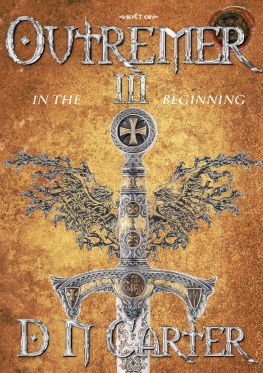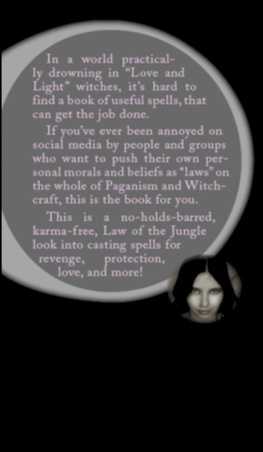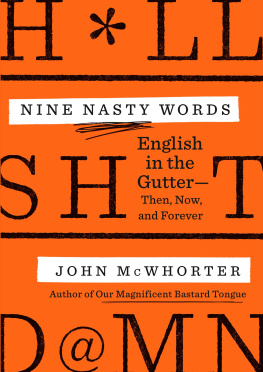NASTY People
Revised Edition
Jay Carter, Psy.D.


Copyright 2004 by Jay Carter. All rights reserved. Manufactured in the United States of America. Except as permitted under the United States Copyright Act of 1976, no part of this publication may be reproduced or distributed in any form or by any means, or stored in a database or retrieval system, without the prior written permission of the publisher.
ISBN: 978-0-07-143585-7
MHID: 0-07-143585-9
The material in this eBook also appears in the print version of this title: ISBN: 978-0-07-141022-9, MHID: 0-07-141022-8.
All trademarks are trademarks of their respective owners. Rather than put a trademark symbol after every occurrence of a trademarked name, we use names in an editorial fashion only, and to the benefit of the trademark owner, with no intention of infringement of the trademark. Where such designations appear in this book, they have been printed with initial caps.
McGraw-Hill eBooks are available at special quantity discounts to use as premiums and sales promotions, or for use in corporate training programs. To contact a representative please e-mail us at bulksales@mcgraw-hill.com.
TERMS OF USE
This is a copyrighted work and The McGraw-Hill Companies, Inc. (McGraw-Hill) and its licensors reserve all rights in and to the work. Use of this work is subject to these terms. Except as permitted under the Copyright Act of 1976 and the right to store and retrieve one copy of the work, you may not decompile, disassemble, reverse engineer, reproduce, modify, create derivative works based upon, transmit, distribute, disseminate, sell, publish or sublicense the work or any part of it without McGraw-Hills prior consent. You may use the work for your own noncommercial and personal use; any other use of the work is strictly prohibited. Your right to use the work may be terminated if you fail to comply with these terms.
THE WORK IS PROVIDED AS IS. McGRAW-HILL AND ITS LICENSORS MAKE NO GUARANTEES OR WARRANTIES AS TO THE ACCURACY, ADEQUACY OR COMPLETENESS OF OR RESULTS TO BE OBTAINED FROM USING THE WORK, INCLUDING ANY INFORMATION THAT CAN BE ACCESSED THROUGH THE WORK VIA HYPERLINK OR OTHERWISE, AND EXPRESSLY DISCLAIM ANY WARRANTY, EXPRESS OR IMPLIED, INCLUDING BUT NOT LIMITED TO IMPLIED WARRANTIES OF MERCHANTABILITY OR FITNESS FOR A PARTICULAR PURPOSE. McGraw-Hill and its licensors do not warrant or guarantee that the functions contained in the work will meet your requirements or that its operation will be uninterrupted or error free. Neither McGraw-Hill nor its licensors shall be liable to you or anyone else for any inaccuracy, error or omission, regardless of cause, in the work or for any damages resulting therefrom. McGraw-Hill has no responsibility for the content of any information accessed through the work. Under no circumstances shall McGraw-Hill and/or its licensors be liable for any indirect, incidental, special, punitive, consequential or similar damages that result from the use of or inability to use the work, even if any of them has been advised of the possibility of such damages. This limitation of liability shall apply to any claim or cause whatsoever whether such claim or cause arises in contract, tort or otherwise.
Dedicated to our great-great-grandchildren
Contents
Acknowledgments
Many thanks to the following people for their help with the book: Linda Aglow, Dr. Astrid Jimenez Alvarado, Sandra DiSantis, Stanley Dudkin, Lotis Gudez, Dr. Monica P. Hottenstein, Dr. Sanford Mintz, Art Parker, Dr. Orest M. Pawluk, Stacy Prince, Jan Radabaugh, Sheila Sen-Carter, Dr. Margaret Verhulst, Nickie Williams, Anne Marie Zagnojny, Dr. Loretta Halpine-Martin, Dr. David OConnell, and all my students. A special thanks to my literary agent, Sherrill Chidiac; to Dave Leiter for his encouragement; and to Barbara Karesh-Stender.
From a Student
I first met Jay Carter through his Communications Workshop at a local adult evening school. I signed up for the course to help in my never-ending search for better-spoken expression. The course helped my speaking, but it was really about something else. It was about people, and how they think and act. In other words, it was a course in practical psychology.
As part of this course, Jay taught us about invalidation. Invalidation is what I used to call putting other people down to bring yourself up. But even though I had discovered the phenomenon of invalidation on my own, I didnt know where it came from, why it existed, how it really worked, or what to call it. Most important, I had no idea how deadly it could be to life, liberty, and the pursuit of happiness.
What I learned in Jay Carters class about invalidation has changed my life. Now, at the very least, when invalidation is used in my presence, I know it instantlywhether it comes from someone else or from me (blush). I do my best to educate those involved about the mechanics of invalidation. To do this, I passed out copies of Jays paper on invalidation.
After a while, though, copying and distributing those pages got to be a lot of work. Besides, at that rate, only about one person in ten million will ever learn what invalidation is all about. Its too important to keep it a secret.
So Ive nagged, bullied, and generally pestered Jay into writing this little book on invalidation. I think youll be glad I did.
L. David Leiter
From the Author
Every book has a story behind it, and I thought you might like to know the story behind this one. My motivation to gather the information presented here came from my own situation. I felt unhappy and didnt know why. I felt as if I were stuck in some sort of trap that I couldnt identify.
While I was pursuing my graduate degree in psychology, I kept a journal in which I wrote about my personal experiences, meetings with clients and professionals, and course readings. After a while, I began to notice that some of the dysfunctional features I was reading about were evident in people I knew. Then one day, while I was away on business and out of my daily environment, it hit me. I realized, objectively, that I was being invalidatedconstantly.
When I first acknowledged how much I had been invalidated, I was enraged. It took me months to work off this anger. I wrote a lot of negative things about invalidators. I ran hard and fast. I purchased a punching bag. I chopped wood with a vengeance. I screamed obscenities when I was alone in my car. I passed my writings around to people so they could help me agree what terrible, no-good people invalidators are. I hated invalidators. I was out to get them.
Then one day, I shared my writings with a good friend at work. I had always admired this man. I called my collection of writings The Invalidator.
He came back to me in tears saying, Im an invalidator. Ive been making my mother miserable for years.
I was taken aback! I didnt want to believe him. He asked me, How can I stop? I stumbled over myself; I had nothing to tell him. My whole agenda had been to attack invalidators, not to help them. Driving home that evening, I realized that I had become an invalidator. I thought of my friend and his plight, and I cried. How could I have been so unaware? I had only written half a book! What about the invalidators themselves? How could they be helped?


















